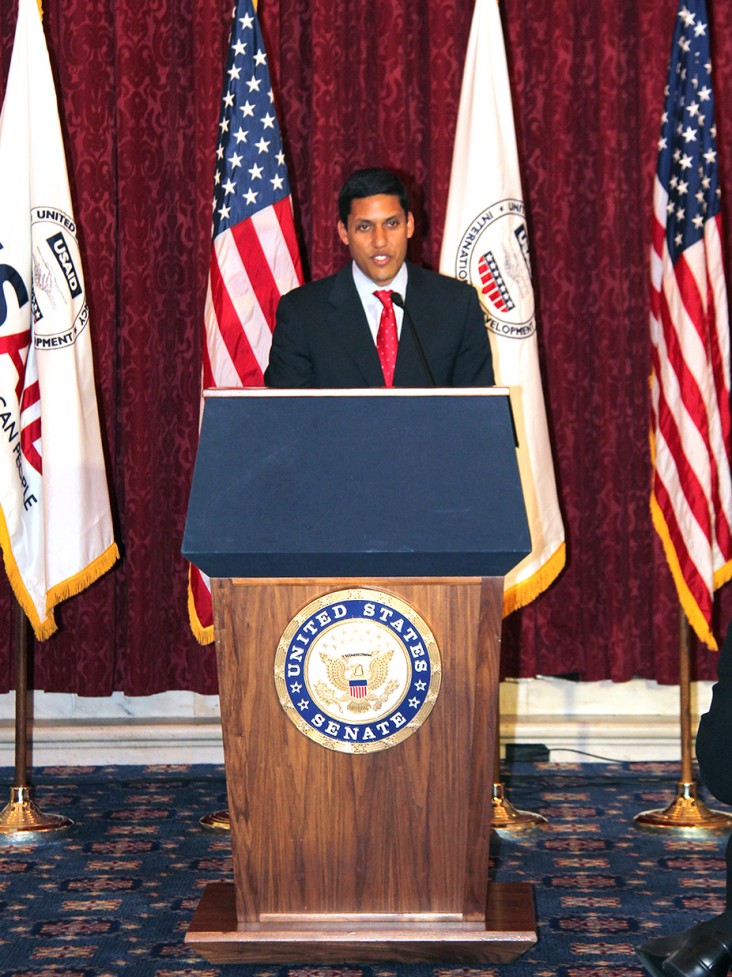U.S. Water and Development Strategy Launched

On May 21, 2013, members of Congress from both sides of the aisle joined USAID Administrator Rajiv Shah in the Kennedy Caucus Room of the Russell Senate Office Building in Washington, D.C. to launch the U.S. Government’s first Water and Development Strategy. The Strategy places an increased priority on water issues within USAID’s development agenda, calls for water programming to focus on promoting health and food security, and emphasizes the importance of partnerships, innovations, and sustainability. About 300 people attended the standing-room only event, in which speakers discussed topics including water and gender, the importance of water cooperation, and water’s relationship to national security. Speakers included Senator Dick Durbin, Senator Chris Coons, Representative Earl Blumenauer, Representative Ted Poe, USAID Administrator Rajiv Shah, and USAID Global Water Coordinator Christian Holmes.
WASH For Life Winners Announced
On March 21, 2013, seven winners were announced in the USAID Development Innovation Ventures and the Bill & Melinda Gates Foundation partnership WASH For Life’s open competition for development ideas. These grantees are testing sustainable, cost-saving water and sanitation solutions around the developing world. The winners are The Dispensers for Safe Water Program, which will bring treated drinking water to over 5 million people for approximately $0.50 per person per year; the Rand Corporation, which will make water filters accessible to low income groups through mobile payments; Sanergy, which is converting human waste into high-quality organic fertilizer; IDEO.org, which is using open source mapping to raise support for improved sanitation; Bear Valley Ventures Ltd., which is developing anti-microbial hand sanitizers for poor urban communities; WaterSHED, which is introducing an affordable and attractive hand-washing device in Vietnam; and Kickstarter International, which is testing financing models to make shallow water irrigation pumps more accessible.
USAID Joins G-8 International Conference on Open Data for Agriculture
On April 29-30, 2013, USAID participated in the G-8 International Conference on Open Data for Agriculture. The conference brought together food security experts, data scientists, and policymakers from around the world to discuss the connection between open agricultural data and food security. At the conference, the U.S. Government and its private sector partners unveiled new data sets. This new information will be accessible to the public in order to sustainably increase food security. The conference attracted agricultural leaders to discuss the role of open data and its implications on agricultural production increases, improving private sector growth, and ensuring global food security. The event featured a panel on the theme “Agricultural Open Data: Implications for Developing Countries” and attracted attendees from Japan, Uganda, Mozambique, and the United States. This event builds upon a previous commitment made at the 2012 Summit, which launched the New Alliance for Food Security and Nutrition, and focuses on helping 50 million people in sub- Saharan Africa lift themselves out of poverty by 2022 through agricultural growth.
USAID and India Work Together To End Preventable Child Deaths
On March, 6, 2013, USAID renewed its work with the Government of India to end preventable deaths of children under 5 by further strengthening India’s Call to Action on Child Survival and Development. This commitment includes a campaign targeted at urban and rural communities in all states. The campaign will integrate and leverage partners’ efforts by increasing opportunities for private sector engagement and targeting high priority states and districts with low health indicators. USAID Administrator Rajiv Shah said, “I applaud the Government of India’s commitment to saving children's lives by establishing an integrated approach to address reproductive, maternal, and newborn, child, and adolescent health. The launch of the roadmap, the dashboard, and the scorecard are very significant. They will help India to effectively plan, monitor, and track the progress to end preventable child death.” Administrator Shah granted extensions to the Integrated Maternal and Child Health Project, which helps targeted states establish quick response teams to accelerate child survival efforts and the Health of the Urban Poor Project, which implements health programs in urban areas.
IHA World Congress on Advancing Sustainable Hydropower
The International Hydropower Association (IHA) World Congress on Advancing Sustainable Hydropower convened for its biennial conference from May 21-24, 2013 in Kuching, Malaysia. The conference brought together officials from governments, NGOs, international organizations, and financial institutions to discuss hydropower policy, experiences from the field, and solutions to climate, water, and energy challenges. Topics discussed include financing models, hydropower development, sustainability, energy policy, water policy, and climate change.







Comment
Make a general inquiry or suggest an improvement.